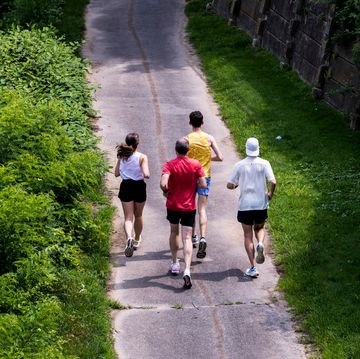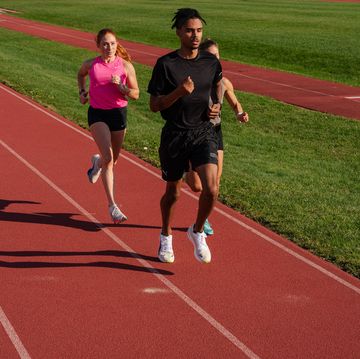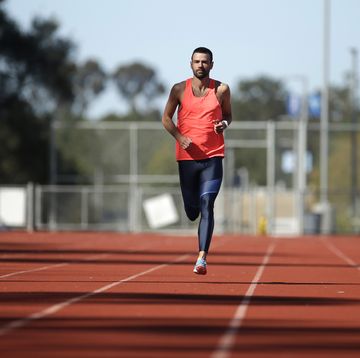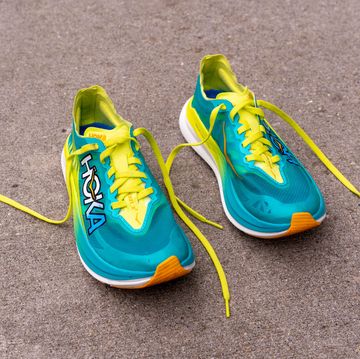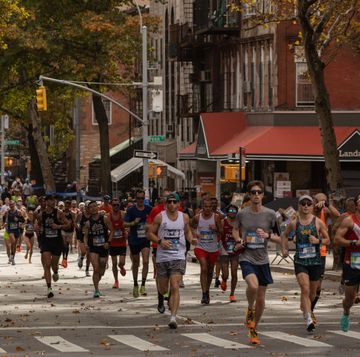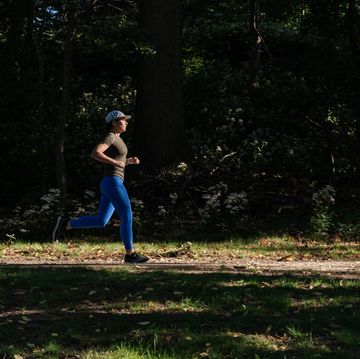When you look at a pro runner, you probably think they have it together all the time. But that isn’t always the case. Just ask Deena Kastor. Yep, that Deena Kastor: Olympic bronze medalist, the first American woman to run a marathon in under 2:20, a Chicago and London Marathon winner—just to name a few of her accolades.
Ahead of the 2023 Paris Marathon, the 50-year-old admitted she was undertrained going into the race, which is why she didn’t have a time goal.
Normally, Kastor would prepare for 26.2 for five to 10 weeks—12 weeks if she really wanted to get to the starting line feeling fully confident. Her training would consist of runs seven days a week, including speed sessions for efficiency early in the week, a five-mile uphill tempo run or a tempo run up to 12 miles at race pace later in the week, and a long run of about two and a half hours.
More From Runner's World

Training for Paris was different, though. “On a good week, I probably got five runs in, at worst, none at all,” says the author of Let Your Mind Run. She even did a two-hour treadmill run about two weeks prior to race day that a friend called a panic run and “was really sore from it,” she says.
Still, Kastor, who flew under the radar for this race—it was her first time picking up her own bib and experiencing a marathon expo—managed an impressive 3:12:15. And while the road did get rough, she crossed the finish line feeling happy with her effort.
We caught up with Kastor before and after the race, and chatted about mental toughness and boosting confidence when your training feels subpar, plus how to redefine your goals away from speed and toward enjoyment.
Lean on Your Mental Strength
Just because your training leading up to the big day or the race itself isn’t going according to plan doesn’t mean you have to count yourself out. “My physical body may not have been ready, but I’m always mentally prepared for challenges,” explains Kastor. She adds that the mental portion is the most important part of the marathon and one reason she won’t retire from running, because she never wants that mental part to atrophy.
So, at the point of the marathon when it feels like your body may betray you and you begin to question why you have laced up for a 26.2-mile journey, Kastor says this is when the race becomes about reinforcing the mental traits you have worked to build. You pushed through tough training runs and days when you felt tired or unmotivated, or even days when obligations outside of running made you feel defeated—so it’s time to call on that can-do attitude. “When you have that persistence behind you and that grit, then it’s there in life when things also get fatiguing or challenging or disruptive,” she says.
Switch Your Thinking to Stay Positive
Grit is great, but in the midst of toughing it out, positivity also plays a role. According to Kastor, manipulating your thinking to serve you better is like a chemical change that happens in your body. “There’s always that pause [where you examine] how could shaping this refrain in my head help me a little bit more,” she says. “When I sit there and play with it, I can feel when it works.”
That switch in mental narrative may play out in a stronger stride and a prouder moment. “[I think] okay, that just completely change my posture or even the direction of my thinking and I went from this downhill slope to ‘this is possible.’ And even if it doesn’t work out to the heights that I anticipate, it’s my best self,” Kastor says.
Kastor admits that positive thinking is a skill she has developed over time, one that often impresses even her teammates. “I work hard at it,” she says. “That’s what I have to do to feel fulfilled, and when you fill your own cup you can allow others to drink out of it. So, really making sure [an optimistic mindset] is a priority, but then also making sure that I can share those things with those around me so they can take some of the good and they don’t have to learn the hard way.”
Reevaluate Your Goals
Are your initial goals out of reach? Reassess. One way to do that is by having multiple goals (think an “A” race time, a “B” race time, and a “C” race time) prior to hitting the starting line. Or nix the time goals all together, which is what Kastor did in Paris so she could enjoy the run, without the potential disappointment of not hitting a specific number.
Kastor also says it may help to reevaluate your goals based on where you are in your life. With this new decade, she has begun transitioning from speed-based objectives like running down personal bests to using the sport for emotional and mental growth. As she mentions, challenging yourself to maintain a positive mindset and learning to lean on the strength of your mind when your body starts to tire can have real benefits for both your performance and your life. So making these mental tools a focus is a pretty great switch in goal setting.
The Abbott World Marathon Majors six-star finisher also says one of her newest goals is to use the marathon to see the world, ticking destinations off of her bucket list. For her, this includes the Marathon du Medoc in the south of France, where “every year there’s a different theme [and] you dress in costume and you sip on wine instead of Gatorade.”
Assist a Fellow Runner
When you are out there on the course, if it’s not your day, it could be the day you potentially help someone else reach their goals. Kastor throws a nod to fellow runners Des Linden and Shalane Flanagan and how they ended up running the 2018 Boston Marathon together, helping each other along the way. It was very much a “it’s not about me now, I’m shutting down. I’m giving up on myself, but let me help you,” moment, which Kastor found powerful.
“It’s an interesting anecdote that it is the loneliness of the long-distance runner—but really, would any of us be out there if we had to do it alone?” she asks.
If you see someone struggling on the course, or have a friend who wants to run a marathon but needs an accountability partner, step in to help and provide their encouragement. Also, consider this: You can think of your good deed as an act of volunteerism, which research shows can help boost your mental health by reducing stress.
Draw Energy From the Pact
After a couple of bad races—dropping out of the 2018 Boston Marathon halfway through due to hypothermia and getting knocked down twice and dislocating her shoulder in the 2019 Tokyo Marathon—Kastor thinks back to her foot race in the 2022 Berlin Marathon. She wanted to run “fast enough to be proud of it, but not too hard that I couldn’t just take it all in and enjoy it.”
She says the race director Mark Milde told her she was starting in the first corral because they wanted to introduce her. “Because I was in the first corral, I got passed by over a thousand people that day, and at first I was like, this is going to be demoralizing if I have to spend 42 kilometers continuing to be passed by people, but it was not,” she says. “Every person that went by was like, ‘good job you can do it.’ I had my six-star finisher bib and people were encouraging about that. And people wanted to stop and take a selfie in the middle of the road.”
Kastor says there is something about the masses in a race that is incredibly empowering. “[Even if] everyone’s purpose, their reason, their why is so totally different, it still doesn’t change the journey,” she says.

Rozalynn S Frazier is an award-winning, multimedia journalist, and certified personal trainer living in New York City. She has created content for SELF, Health, Essence, Runner's World, Money, Reebok, Livestrong, and others.

